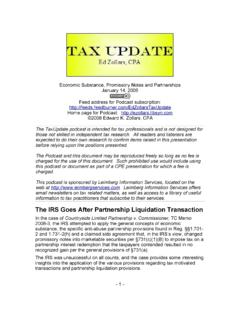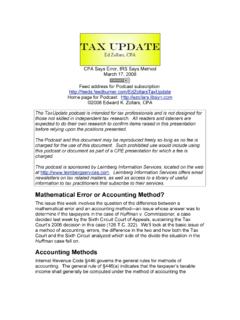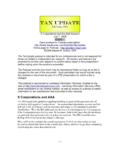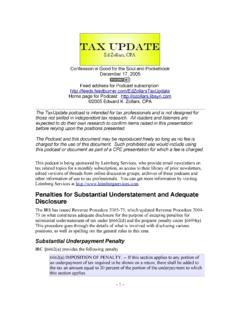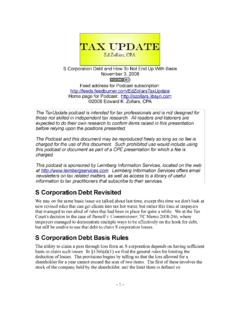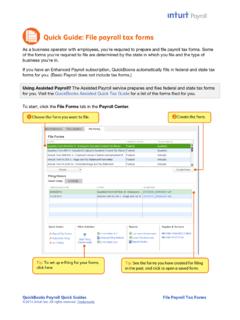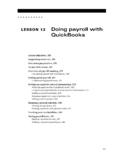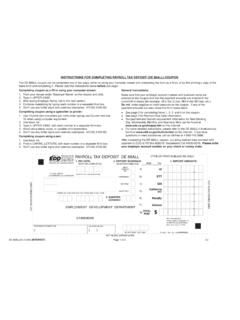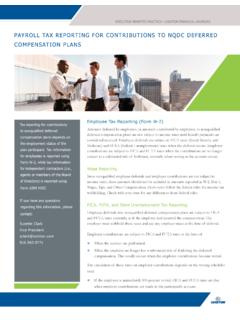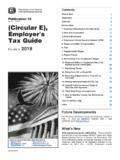Transcription of Payroll Services and Payroll Tax Deposits - Ed Zollars
1 Payment Encore: Liability of Taxpayer for Embezzlement by Payroll ServicePodcast for May 18, 2007 Feed address for Podcast subscription: page for Podcast: 2007 Edward K. Zollars , CPAThe TaxUpdate podcast is intended for tax professionals and is not designed for those not skilled in independent tax research. All readers and listeners are expected to do their own research to confirm items raised in this presentation before relying upon the positions presented. The Podcast and this document may be reproduced freely so long as no fee is charged for the use of this document. Such prohibited use would include using this podcast or document as part of a CPE presentation for which a fee is podcast is sponsored by Leimberg Information Services , located on the web at Leimberg Information Services offers email newsletters on tax related matters, as well as access to a library of useful information to tax practitioners that subscribe to their Services and Payroll Tax DepositsThe case we will look at this week breaks no new ground, but does offer a cautionary tale about the issues taxpayers need to consider to the extent they rely on others to fulfill various obligations in this case, a taxpayer who used a Payroll service to handle its Payroll tax deposit responsibilities.
2 The bad news in this case is that the service, while taking the funds from the taxpayer, did not actually forward the funds to the IRS, but rather kept them for personal week's case deals with the Third Circuit Court of Appeals recent rejection of the appeal of the District Court of New Jersey's 2006 decision in the case of Pediatric Affiliates, v. United States, (2007-1 USTC 50,477, affirming 2006-1 USTC 50,201). At the end of the day, the court ruled that even though all parties agreed that Pediatric Affiliates had properly withheld the funds from their employees Payroll and transmitted those funds to the Payroll service that then misappropriated the funds, they still owed the taxes, plus interest and penalties. The result, while harsh, is consistent with prior cases in this 1 -Payment EncorePodcast of May 18, 2007 EmbezzlementThe basic facts in the case are outlined early in the District Court's decision.
3 Pediatric Affiliates prior to 1998 had used a Payroll service to prepare its Payroll taxes but had made its own Payroll tax Deposits . However, when the rules were changed that required Pediatric Affiliates to make Payroll taxes electronically, they made what turned out to be a very costly decision. As the court explained:Pediatric asserts that around 1998, the IRS changed its Payroll tax regulations to require businesses to electronically transfer their tax payments to a depository service or independent Payroll tax service. ( Id. at 13.) Then, the service would submit the tax payments to the IRS. 1 ( Id.) Pediatric retained PAL to pay its Payroll taxes. ( Id. at 17.)Of course, Pediatric Affiliates could have simply signed up directly for the EFTPS service and continued to pay Payroll taxes directly. However, at that time it would not have been usual for taxpayers and their bookkeepers to be wary about having to switch from taking a check and coupon down to their local bank and now needing to do some fancy electronic transfer.
4 To many that seemed complex and, frankly, the simplest solution clearly seemed to be to simply let the Payroll service take care of the Deposits from this point forward. In fact, Payroll Services actively marketed themselves at the time as simpler solution to the problem something that was true and, in most cases, worked very well for the taxpayer. However, such would not be the result for Pediatric Affiliates who managed to find a bad apple for their Payroll service. Unknown to Pediatric, Menachem Hirsch ( Hirsch ), the founder of PAL, embezzled the tax payments that Pediatric and other clients transferred to PAL. 2 ( Id. at 14.) Hirsch would prepare and send to Pediatric a tax form that reflected Pediatric's actual tax liability. ( Id. at 15.) Pediatric then, would transfer money in the amount of its tax liability to Hirsch.
5 ( Id.) Hirsch, however, would also prepare a tax form that reflected an understated tax liability. ( Id. at 15.) He sent the understated form and amount to the IRS, and invested the difference between the amount he received from Pediatric and the amount sent to the IRS in a personal hedge fund. ( Id.)Unfortunately for Mr. Hirsch, the IRS did eventually notice that things weren't adding up not an unexpected development since at some point the issue would arise that the payments transmitted were going to be too little to cover the withholdings reported on the Forms W-2. From the court opinion it's not clear how Mr. Hirsch thought he would be able to juggle things to keep this issue from arising it's possible he believed he would make a fortune in the hedge fund, be able to then make Deposits before year end that would fix the withholdings and keep them in line with the W-2s (many embezzlers do have grand plans that will get everything paid back before anyone notices).
6 Or perhaps Mr. Hirsch simply hadn't factored this issue into his 2 -Payment EncorePodcast of May 18, 2007 , in any event, the IRS started sending notices to Pediatric Affiliates who decided the IRS must be crazy. Since off the wall notices from the IRS are not unheard of, at least initially the explanation may have seemed received notice from the IRS in 2002 that it had underpaid its Payroll taxes in 1999 and 2000. ( Id. at 19.) Pediatric (1) reviewed its withdrawal records, (2) found that there was no discrepancy between the amount of funds transferred and its tax liability, and (3) concluded that the IRS notice was an error. ( Id. at 19-20.) However, it later became clear that something was seriously amiss as the situation was not remedied quickly with simple correspondence. The IRS then sent second and third notices of delinquency to Pediatric.
7 ( Id. at 21, 24.) Again, Pediatric checked its records and found no discrepancy between the amount owed and amount paid. ( Id. at 21-26.) The IRS finally sent Pediatric documents that reflected a discrepancy that was not apparent based on the information Pediatric was given by PAL. ( Id. at 27.) Pediatric contacted Hirsch and was told that Hirsch had misappropriated the funds Pediatric had transferred to Hirsch. ( Id. at 30.)Mr. Hirsch now faced a number of legal problems, both civil and criminal. The United States brought criminal charges against Hirsch in the United States District Court for the Southern District of New York in December 2004. (Pl. Ex. A.) He was charged with wire fraud and tax evasion. ( Id.) The indictment alleged that Hirsch converted over $ 2,314, of over 50 clients' funds, and filed over 160 false and fraudulent tax forms.
8 ( Id.) Hirsch (1) pled guilty to both counts, (2) was assessed monetary penalties, and (3) sentenced to serve thirty-seven months in prison. (Pl. Ex. 3.)Pediatric brought an action in the District of New Jersey against PAL and Hirsch, on July 25, 2002. 3 (Dkt. no. 02-3589 (GEB).) Pediatric asserted claims for fraud and violations of the Racketeering Influenced and Corrupt Organizations Act ( RICO ), and sought monetary damages. (Compl., dkt no. 02-3589.) Default judgment was entered in Pediatric's favor in the amount of $1,204, , on August 21, 2003. (Dkt. no. 02-3589, entry no. 25.)Rough math tells us that while Mr. Hirsch may have stolen from 50 clients, Pediatric Affiliates got hammered a bit more than the average Hirsch client. And, not unexpectedly, Pediatric Affiliates found that while they had a judgment, it ultimately wasn't collectible as the court noted in a footnote:As to Samuel Hirsch, the action was stayed and administratively terminated because Hirsch filed for bankruptcy protection.
9 (8-21-03, Order, Dkt. no. 02-3589.)- 3 -Payment EncorePodcast of May 18, 2007 (Mr. Hirsch is also referred to as Samuel Hirsch, as the court points out in a footnote.) So now the issue becomes does Pediatric Affiliates have to come up with the Payroll Deposits , plus penalties and interest, to make up for Mr. Hirsch's embezzlement, or is the government the one that is out of luck? Pediatric argues that they should not be held liable for a number of reasons all of which the court Positions of the PartiesThe District Court outlined a quick summary of each parties' position in the case:Defendants argue the complaint should be dismissed because Pediatric is liable to pay (1) the taxes it owes as a matter of law, and (2) the interest it owes on its taxes because Pediatric's tax deficiency is not attributable to an error or delay of the IRS.
10 (Defs. Br., at 1-2.) Pediatric argues that it is not responsible for the tax or interest at issue because (1) it paid the taxes it owed to PAL, (2) Pediatric is not responsible for Hirsch's subsequent embezzlement of those funds, and (3) the United States is judicially estopped from recovering Payroll taxes from Pediatric. (Pl. Br., at 16-17.) It argues that the government's recovery in this matter was the conviction and incarceration of Hirsch. ( Id.) To enforce Pediatric's tax liability in addition to incarcerating Hirsch would amount to a double recovery for the United States. ( Id.)The court then went on to consider these issues, eventually deciding in favor of the Already Paid Them and Don't Owe Them AgainPediatric pointed out that they already paid the taxes in question, and they assert they should not be held liable for Hirsch's failure to transfer those funds over to the IRS.

